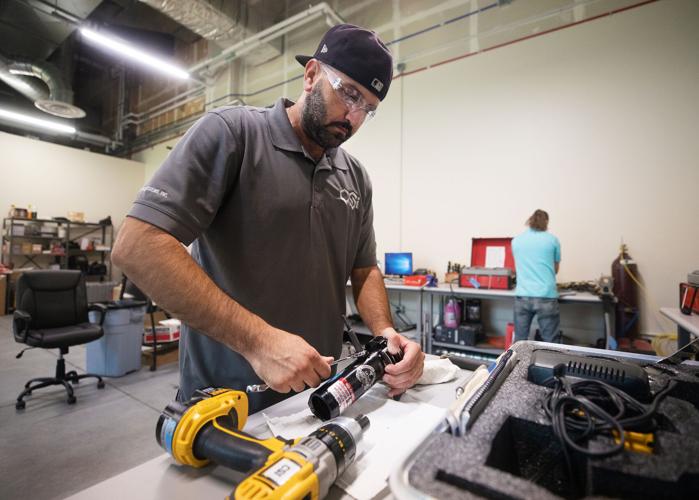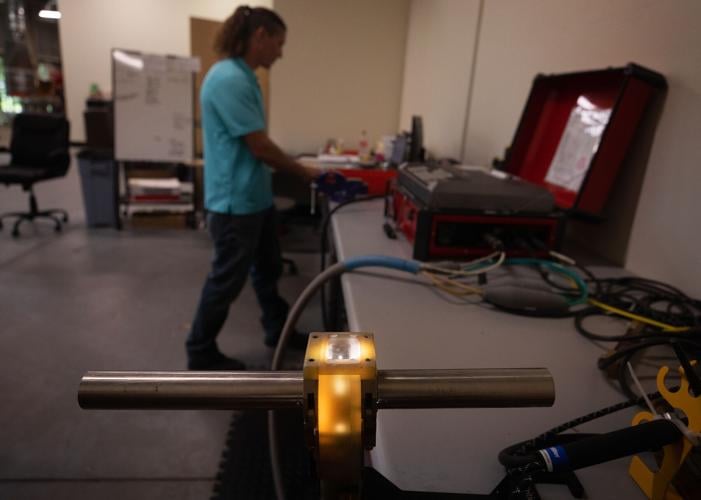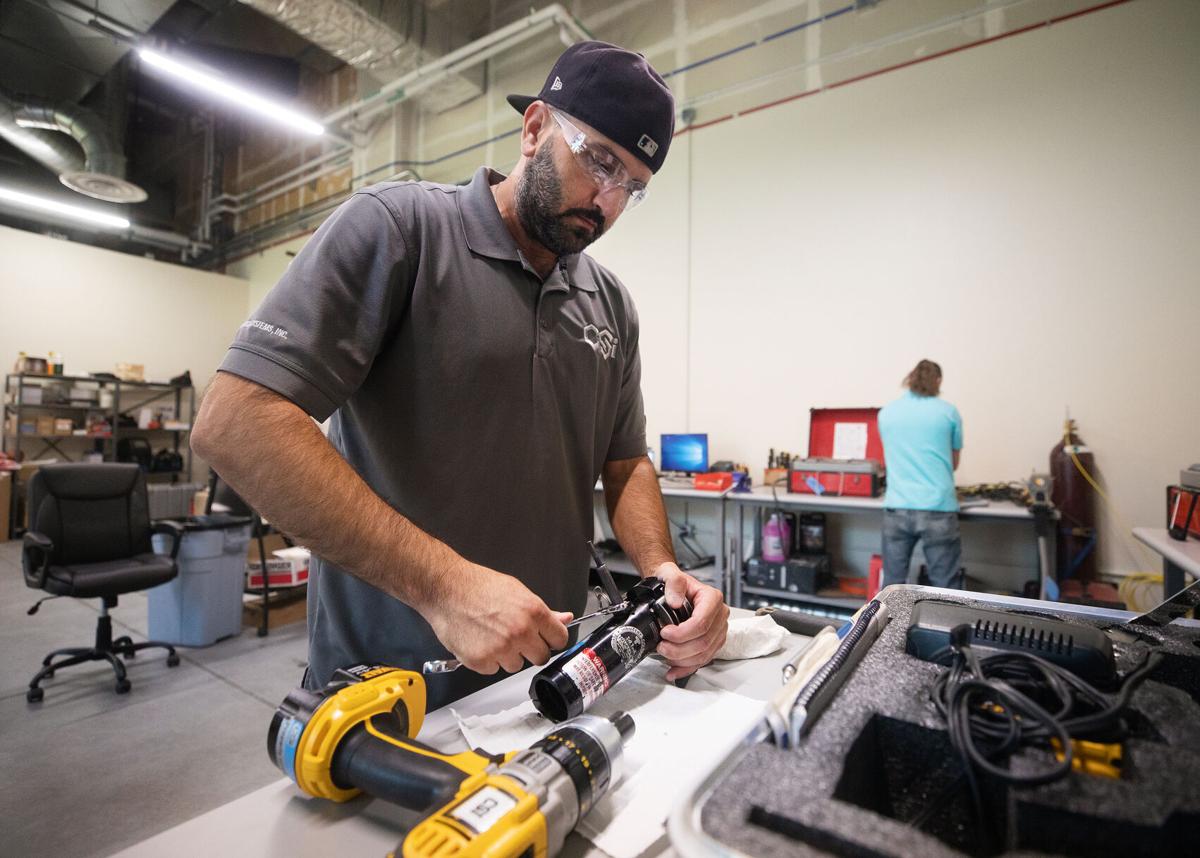An Idaho-based industrial systems company is the latest company to take up residence in the University of Arizona Technology Park on South Rita Road.
Critical Systems Inc. recently opened a new research and development and assembly office at 9052 S. Rita Road for its orbital welding repair group and specialized gas-valve division.
Based in Boise, Critical Systems also provides systems to deliver and process industrial gases, such as those used to deposit layers of materials in semiconductor manufacturing.
In its 7,000-square-foot space at the UA Tech Park, the company will develop and make systems for orbital welding — joining segments of tubing or pipes with a welding head that rotates around the work piece — as well as forged brass gas valves for medical, semiconductor and biotech facilities sold through its Dancar subsidiary.

A fusion welding machine is tested on a metal pipe at Critical Systems Inc.
The UA Tech Park will provide the ideal platform for Critical Systems to respond rapidly to growing business demands, as CSI expands into the medical industry.
The company cited the tech park’s versatility and extensive amenities along with the benefit of a well-established university research park campus.
“The UA Tech Park was always our top choice when looking to expand,” said Troy Reese, general manager at CSI. “We’re excited to see just how far we can push the industry forward in the coming years.”
Ted Jones, founder and president of Critical Systems, said only about five of the company’s roughly 100 employees are at work in Tucson so far, but the company plans to ramp up and hire quickly to meet expected demand.
Critical Systems is essentially moving its Dancar valve business, which the company acquired in 2021, from Middlebury, Connecticut, to Tucson, said Jones, who founded the company in 1998 and is himself based in Salt Lake City.

Jones
“I would expect the hiring is going to be pretty significant in Tucson — I think we’re going to grow quite a bit,” Jones said, noting that the company plans to hire most of its staff locally.
Critical Systems’ Orbital Group currently employs mechanical engineers, designers, equipment technicians and welders.
New FORGE program
The University of Arizona’s downtown business accelerator is launching an intensive new program to help startups that are ready to break into broader commercial distribution of their products or services.
The UA’s FORGE (Finding Opportunities and Resources to Grow Entrepreneurs) has opened applications for its new FORGE Ahead Crucible, an eight-week program that will take place at FORGE at Roy Place in downtown Tucson from Sept. 12 to Nov. 2.
The Crucible program has an application deadline of Aug. 20, and company founders will be notified if they have been selected by Aug. 24.
Startup companies can apply at forge.arizona.edu/crucible
Teams accepted into the Crucible program will receive an $8,000 stipend to offset travel and related costs.
Participants can expect intensive professional development work, mentorship from industry professionals, weekly milestone check-ins, business-pitch practice sessions, investor introductions and opportunities to demonstrate their work.
FORGE Founding Executive Director Brian Ellerman said FORGE’s yearlong FORGE Ahead Residency program has been successful in helping new ventures scale up and find investors.
“Crucible fills an important need for founders that are farther along in their journey and want to make that transition in a shorter timeframe,” Ellerman said.
The Crucible program focuses on startup teams that have gained traction in revenue, users, market or fundraising, and are on the verge of breaking into broader commercial distribution.
NuvOx gets funding
Tucson-based drug developer NuvOx Therapeutics recently won funding of nearly $200,000 from an Indiana-based angel investor group to further clinical trials of its oxygen-based therapeutics for diseases including brain cancer and stroke.
VisionTech Angels, one of the most active angel investing networks in the Midwest, invested $196,500 in the company NuvOx, with 27 individual signing checks, the company said.
Founded in 2008, NuvOx is focused on therapeutic delivery of oxygen based on patented technology for gas “microbubbles” originally developed as an ultrasound imaging contrast agent by University of Arizona professor emeritus Dr. Evan Unger.
Unger, who has more than 100 patents, developed a microbubble contrast agent in the 1990s and sold it to chemicals giant DuPont in 1999 for about $40 million. Launched in 2001 and approved for ultrasound imaging of the heart, the drug is still the most prescribed drug of its kind in the U.S.
Meanwhile, NuvOx has since developed new clinical uses for its gas microbubble to deliver oxygen therapies, including reducing the resistance of cancer tumors to radiation treatment.
The company has seen positive results in completed Phase Ib/II clinical trials for use of its cancer drug and in a similar trial for a related drug to treat ischemic stroke.
More human trials are underway or planned, but it will still take years and tens of millions of dollars in funding to bring one drug to market.
The recent angel investment is part of a bridge round of funding, following a $10.4 million Series A funding round.
NuvOx has also won $14 million in grants from the National Institutes of Health, the Department of Defense and other government funders.
The company, which set up a small-scale manufacturing plant for its drugs at its longtime office site near downtown in 2021, is looking to raise $25 million to $50 million more in venture-capital funding to complete clinical trials and bring its drugs to market.
Two Canadian tech startups have joined the University of Arizona Center for Innovation at the UA Tech Park after participating in the center's program for international companies.







